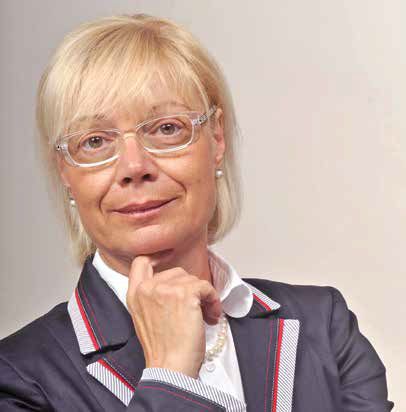Diana Gligorijević, an Executive Board member and Executive Marketing Director of TeleGroup, reveals how to develop a serious regional company from a small family business and how much patience, strength and will is needed for achieving such success.

„There are no coincidental stories. I worked for big companies, like JAT, back in the day, and then I started working for Bell Helicopters which, at that time, had 186,000 employees. When I returned to the country in 1992, after living in the United States and Belgium, it was all about downsizing – from the work volume to the size and the number of employees in the companies in which I worked. At the time, it was very brave to have a private company, and it was natural to work only with those people that you could always rely on – i.e. your immediate family. My vocation is marketing officer and I graduated from the Wharton School with an MBA in marketing management. Back then, many people had never heard of Wharton. Most of them thought that the school had to do something with the NBA in which Divac played, and they usually asked me what was I doing in basketball. People don’t know how much studying, analytical and market research there is in a marketing job“, says Mrs Gligorijević.
How is TeleGroup positioned in its respective sector?
— My husband is a telecommunications engineer, so he knows the profession well, and I know how to present and to promote the company. There were some private companies in the market when we started, but TeleGroup recognized that it had to be positioned in a separate niche. We are ready to collaborate with everyone in order to obtain the biggest and most important projects. It is always important to have a high quality, strong technological back, so to speak.
Speaking from your abundant foreign working experience, what is Serbia’s position on the map of technological innovation and change?
— Serbia has the inferiority complex and it doesn’t realize that small countries needn’t feel poor and weak. However, you need to have a strong sense, will, motive and serious negotiating capacity to fit in as an important link. Immediately after the company’s inception, we partnered with Ericsson in the communication segment. In less than a year, we have become a leading partner for the entire region thanks to five people who have mastered all the required technological know-how. The gist is not in the size but in the speed of the adaptation, the acquisition of new knowledge and its transfer to the users whom you are servicing. People are always looking for support in someone. We were one of the first companies to introduce a 24/7 work model, i.e. a help desk centre, so that our customers can contact us at all times.
Is digitalization a major challenge for our society?
— It is a challenge because the society has to change its habits. This means first breaking the old habits and then getting used to the new ones. Digitalization is very poorly understood here. It is a completely new way of communicating, accepting, and processing information. Technology does not allow for idleness, and this is a fundamental change for this society.
How can we boost the domestic economy?
— We should read, learn and think more because digitalization brings a wealth of data. You need to think carefully how to use them, and to know how to distinguish between useful and surplus information. Only after executing a good analysis and selection, you should apply what is required for your business model. This should be done at least quarterly and changed as needed. Business people can no longer rely on intuition, and today there is no room for this model. Processed, systematized data facilitates thoughtful decision making and this is a result of digitalization.
You did a lot of work with young leaders under the auspices of the American Chamber of Commerce. Is Serbia going to experience an entrepreneurial boom with start-ups?
— It’s hard to figure out what young people want. I try to listen to what the generation of my son, with whom I work closely, has to say and who received the first Young Leader in Change Award from AmCham. We work together and in harmony to demonstrate to young people that having a difference of opinion is only logical and that good results can stem from that. As a tandem, for the past two consecutive years, we were the recipients of the AmCham Award for being the best. We have also shown that we do not always agree with the AmCham and that it is not necessary to always nod your head in agreement. You have to revise your stance when faced with a strong argument, not with a status or a title.
What are your plans in 2019 and 2020?
— Back in the day, we worked with over 40 vendors, today with work with less than 20. Our plan is to create a TeleGroup product, alongside the upgraded semi-finished products that others companies are selling. This is product that we would design and upgrade to fit the needs of our markets.